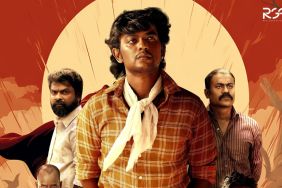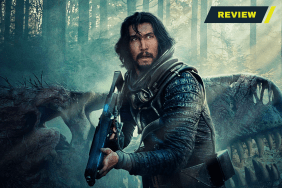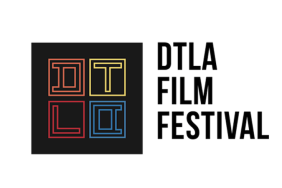
I wasn’t expecting Jean-Marc Vallée‘s Dallas Buyers Club to open the way it does. A skinny cowboy goes a round with two prostitutes under the rodeo grandstand just as a rider falls and is severely injured. The scene soon blurs into black, revealing the film’s title. Next, the same cowboy, a brash, but far from intimidating Matthew McConaughey as Ron Woodroof holds court and a wad of cash as he takes bets on the next ride.
It’s 1986 and while this Texas electrician is concerning himself with bad bets and the next lady he’s going to bed, he’s about to be blindsided with a disease he attributes to “pole smokers” and a variety of other derogatory terms he can think of for the homosexual population. To say he doesn’t make a great first impression, or come off as a man we’re willing to care for, is an understatement, but this is exactly what makes Dallas Buyers Club a knockout.
An accident at work sends Ron to the hospital where blood tests reveal he’s HIV-positive, a diagnosis he refuses to believe, but isn’t naive enough to entirely ignore. After collapsing to the floor of his mobile home, he does his research and heads back to the hospital requesting help, specifically begging for AZT, a new drug being tested that claims to be one of the first possible treatments for HIV. Given only 30 days to live, his journey for survival begins and it’s one that will change his life in ways initially unimaginable.
As was explored in the 2012 documentary How to Survive a Plague, the hope for and search for treatment to HIV/AIDS in the mid-’80s was damn near impossible. Those infected would do almost anything to survive and Ron’s search eventually takes him to Mexico where he hooks up with an American doctor who tells him the dangers of AZT and ultimately puts him on a cocktail of medicines, vitamins and proteins that seem to actually work. Problem is, none of what he’s taking is “approved” by the FDA in the States.
Recognizing the earning potential should he smuggle the drugs into the States and sell them himself, the “Dallas Buyers Club” is born, a “club” avoiding the threat of prosecution for selling illegal, non-approved drugs by charging a fee for a membership after which all “members” receive medication for free.
I knew nothing of the true story of Woodroof before seeing the film, but beyond getting over the initial introduction to this cocksure Texan, his story becomes all the more intriguing due to the fact this isn’t a story of a gay man contracting the HIV/AIDS virus. Woodroof is a gun-totin’, shot of bourbon kind of cowboy. As far as AIDS is concerned, to him it’s a gay disease and to the people he used to call his friends, it still is.
It would be so easy to tell just another story about a gay man contracting the AIDS virus and fighting for their rights alongside the rest of the gay population, but to tell a story of a homophobic straight cowboy from Texas and his eventual friendship with a cross-dressing gay man is to add a layer of complexity that’s not so easy to pull off. However, if you are able to nail down the story’s first and second acts, you deserve every bit of emotional success you’ve earned with the third.
Vallée accomplishes just this with a performance from McConaughey almost assured an Oscar nomination and another by Jared Leto as the aforementioned cross-dresser, Rayon, a character and performance that compliments everything McConaughey delivers as Ron. The two represent an impossible, unexpected match made in heaven.
Just the way Leto and McConaughey move in this film brings their characters added life. The costume design from Kurt Swanson and Bart Mueller (aka Kurt and Bart) is outstanding, most notably a suit worn by Leto late in the film as he visits his father, dressed as a man, only Rayon (his birth name is Raymond) has lost so much weight the jacket nearly envelops his entire body. It’s not often a costume speaks volumes, but this screams at the top of its lungs.
I have to say, however, Jennifer Garner is merely serviceable as Dr. Eve Saks. It’s a role that would have been better served by an unknown actress. This isn’t a character that should detract from the larger story and with a name as big as Garner’s she immediately attracts attention and, on top of that, I just don’t think she has the chops to pull it off.
This small quibble aside, the rest of the film is damn near perfect. The theme of the story comes through in Vallée’s filmmaking as he smartly focuses his attention on the characters and not the disease. So often filmmakers get caught up in the gory details of war, politics, disease, etc. that they forget it’s the characters people are coming to see and where the connection must be made. Without that connection all you are doing is selling fear over compassion and while it’s much easier and obvious choice to sell fear based on our natural instincts, to sell and develop compassion over fear is the mark of a true storyteller, and Dallas Buyers Club serves as the evidence.









